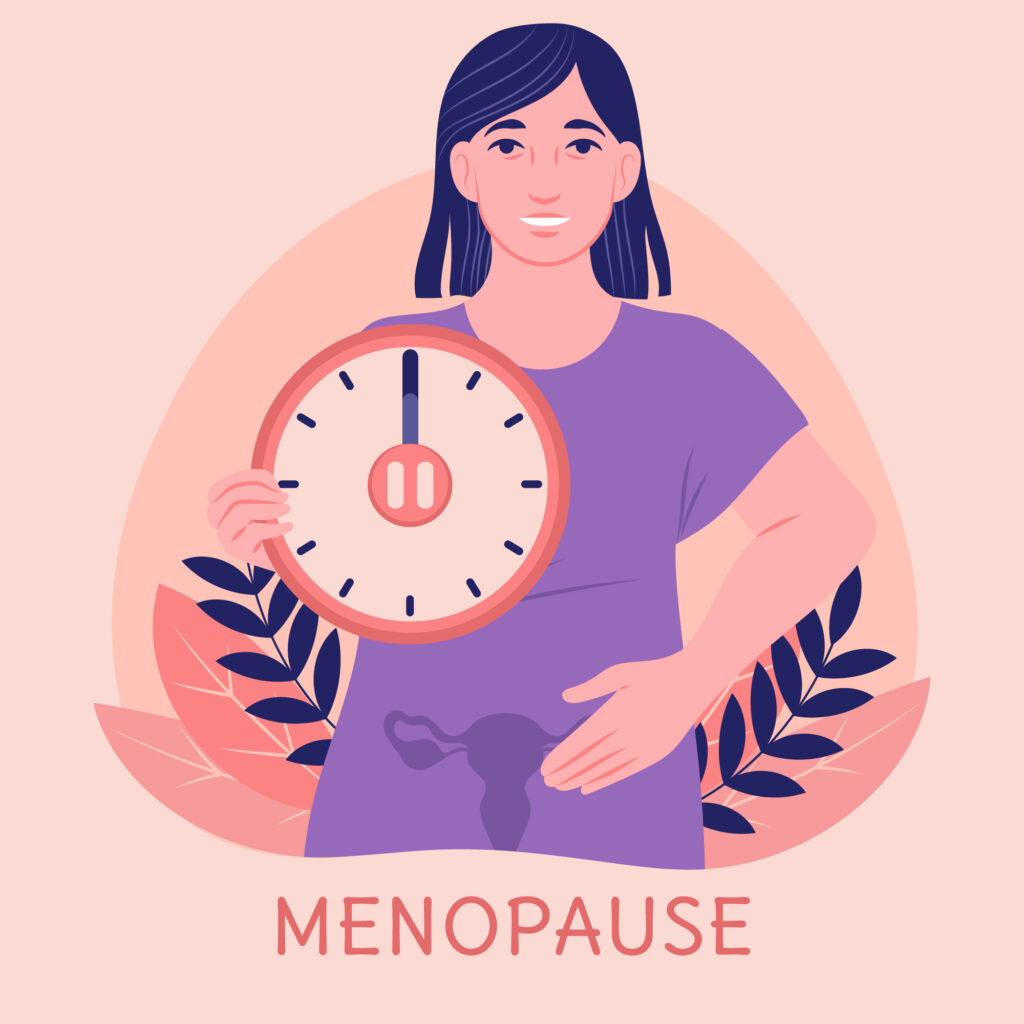Menopause is a natural biological process that marks the end of a woman’s reproductive years. It typically occurs in women between the ages of 45 and 55, although the timing can vary. Menopause is characterized by the cessation of menstruation and a decline in reproductive hormone levels, particularly estrogen and progesterone. This transition can bring about a range of physical and emotional changes as the body adapts to hormonal fluctuations.
Symptoms of Menopause: Menopause can present with a variety of symptoms, which may vary in severity and duration among individuals. Common symptoms include:
- Hot flashes and night sweats.
- Irregular or absent menstrual periods.
- Vaginal dryness and discomfort during intercourse.
- Mood swings, irritability, and anxiety.
- Sleep disturbances, such as insomnia or disrupted sleep patterns.
- Changes in libido or sexual desire.
- Fatigue and decreased energy levels.
- Cognitive changes, including memory lapses or difficulty concentrating.
- Changes in weight distribution, such as increased abdominal fat.
Management and Treatment of Menopause Symptoms:
- Hormone Replacement Therapy (HRT):
- Estrogen therapy, alone or in combination with progesterone, can help alleviate menopausal symptoms such as hot flashes, vaginal dryness, and mood disturbances. However, HRT may carry certain risks and side effects, so it’s essential to discuss the potential benefits and risks with a healthcare provider.
- Non-Hormonal Therapies:
- Selective serotonin reuptake inhibitors (SSRIs) or serotonin-norepinephrine reuptake inhibitors (SNRIs) may be prescribed to alleviate hot flashes and mood symptoms.
- Gabapentin, a medication used to treat seizures and nerve pain, may also be effective in reducing hot flashes.
- Vaginal Estrogen Therapy:
- For women experiencing vaginal dryness and discomfort, topical estrogen creams, rings, or tablets can help restore moisture and elasticity to the vaginal tissues.
- Lifestyle Modifications:
- Maintain a healthy diet rich in fruits, vegetables, whole grains, and lean proteins to support overall well-being.
- Engage in regular physical activity, such as walking, swimming, or yoga, to help manage weight, reduce stress, and improve sleep quality.
- Practice relaxation techniques, such as deep breathing exercises, meditation, or mindfulness, to reduce anxiety and promote emotional well-being.
- Avoid triggers for hot flashes, such as spicy foods, caffeine, alcohol, and smoking.
- Complementary and Alternative Therapies:
- Certain herbal supplements, such as black cohosh, soy isoflavones, or red clover, may offer relief from menopausal symptoms for some women. However, evidence regarding their efficacy is mixed, so it’s essential to consult with a healthcare provider before starting any supplements.
- Acupuncture or acupuncture-like transcutaneous electrical nerve stimulation (TENS) may help alleviate hot flashes and improve sleep quality in some women.
Conclusion: Menopause is a natural and inevitable stage of life for women, marking the end of reproductive function. While it can bring about a variety of physical and emotional changes, there are many effective strategies available to help manage menopausal symptoms and improve quality of life. By working closely with a healthcare provider to develop a personalized treatment plan tailored to individual needs and preferences, women can navigate the menopausal transition with greater comfort and confidence. It’s essential to stay informed about available treatment options, maintain open communication with healthcare providers, and prioritize self-care to optimize overall health and well-being during this life stage.




